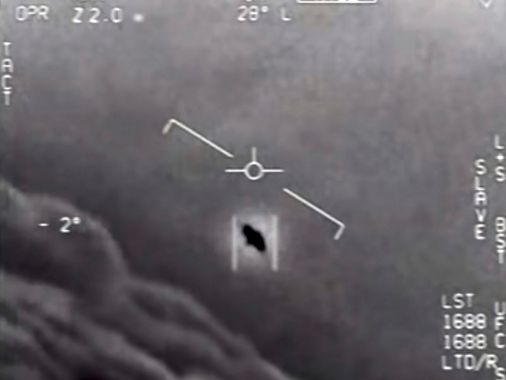The night I saw a UFO

Advertisement
Recently, talk show host Jimmy Kimmel began his nightly monologue with the observation that if this information had been declassified in the ’80s, the conversation about flying saucers would have been a nonstop buzz. Maybe it is the plethora of apocalyptic sci-fi flicks or maybe people are less skeptical, but the reactions to the news about visits from deep space are met with a collective shrug. I don’t get it: The presence of creatures who appear to have the capacity to shatter human civilization no longer seems earth-shattering. Nevertheless, here’s my less than earth-shattering experience.
More than a half-century ago, I was a 16-year-old camping on an empty beach in Plymouth. Up to that point in my life, I had never done drugs, nor have I ever had a psychotic episode.
It was a cool, crystal clear, star-filled summer night. The ocean was calm, the waves gently lapping. I was cuddled up with my beloved golden retriever when seemingly out of nowhere, I looked up to see a huge flying saucer hovering above us.
Back then, almost all the reports I had heard or read about saucers were from people who questioned what they saw. No questions here. The exotic flying machine floating overhead was real.
Advertisement
The vehicle emitted a whirring noise as it targeted my dog and me with a powerful klieg-like light. Shaking my head, I turned to my pooch to see if she had registered anything. Her big brown eyes wide-open, it was evident she was taking in the same sight.
With my pup’s confirmation, my fears gradually mounted that we were going to be picked up by these galactic travelers, who in retrospect, I like to think came from Kurt Vonnegut’s Tralfamadore. Happily, seconds later, I exhaled with relief as the starship turned and sailed away at the kind of mind-boggling speed described by fighter pilots.
Not surprisingly, I didn’t sleep the rest of the night. That summer, I was staying with my older brother, Tom. When I dragged my exhausted body home the next morning, he asked, “How did your night on the beach go?” Immediately, I blurted out my story. Tom chuckled, rolled his eyes, and made some wisecrack. But later in the day he told me that there were reports of sightings in the area that night.
Even during my teen years, I figured that if I saw a UFO up close and so had definitive proof of intelligent life on other planets, my worldview would do a flip. Surprisingly it didn’t. Talk about cognitive dissonance, I know what I saw, and yet I’m not sure I even believe in life on other planets. Maybe it’s a matter of not knowing how to conceive of such a life. Or maybe the line between what we do and don’t believe is not as clear as we would like to think. My close encounter enhanced my empathy for sane people who have a singular insane type of experience that should, at least, shift their perspective on life. What is to be done? Do you keep it to yourself and change your perspective on life? Or do you tell yourself you went bonkers for a fleeting moment? Either way, the question that lingers is: How do we assimilate highly exceptional, over-the-top experiences when they never happen again?
Advertisement
Gordon Marino, professor emeritus of philosophy and director of the Hong Kierkegaard Library at St. Olaf College, is the author of “The Existentialist’s Survival Guide.”
*** This article has been archived for your research. The original version from The Boston Globe can be found here ***


